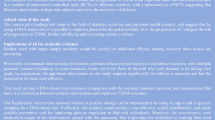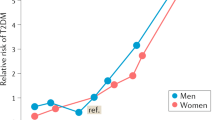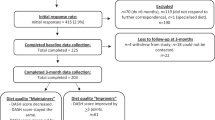Abstract
Objective: To investigate the impact of intensive lifestyle education on dietary practices, exercise and metabolic measurements in people with insulin-dependent diabetes mellitus (IDDM).
Design: Sixty-one volunteer subjects with IDDM were randomised to intensive (Group 1) or standard (Group 2) education programmes for six months. During a second six month period of observation Group 1 subjects received routine surveillance for their condition and those in Group 2 were given intensive advice (phase 2). Current insulin regimens were modified to optimise glycaemic control before the start of the intervention phase. Nutrient intakes, weight, blood pressure, glycated haemoglobin (HbA), plasma lipids, lipoproteins and maximal oxygen consumption (VO max) were measured at the time of recruitment and at three monthly intervals during the trial and phase 2.
Setting: Department of Human Nutrition at the University of Otago.
Results: Glycated haemoglobin decreased significantly in both groups between recruitment and randomisation, the improvement being sustained during the six months of the randomised trial and for group 1 during the six months of post trial observation. A further decrease was seen in Group 2 during the second six month period when they were given intensive advice. Comparable changes were seen with total and low density lipoprotein (LDL) cholesterol in Group 1 during the trial, but significant decreases were only seen in Group 2 in association with intensive intervention (phase 2). These changes occurred in parallel with increases in intakes of carbohydrate and monounsaturated fatty acids, a reduction in intakes of total and saturated fat, and an improvement in maximum oxygen consumption.
Conclusions: A lifestyle programme for people with IDDM results in modest changes in diet and exercise habits sufficient to improve measures of glycaemic control and lipoprotein mediated risk of coronary heart disease independent of changes in insulin regime. More innovative approaches to achieve lifestyle changes are required to meet current recommendations which in turn are likely to produce even greater beneficial changes than those observed here.
Sponsorship: This study was supported by the Eli Lilly Research Grant (Eli Lilly and Company (New Zealand) Ltd), The Deans Research Grant (Otago Medical School, New Zealand) and The New Zealand Dietetic Association (Abbott Award).
This is a preview of subscription content, access via your institution
Access options
Subscribe to this journal
Receive 12 print issues and online access
$259.00 per year
only $21.58 per issue
Buy this article
- Purchase on Springer Link
- Instant access to full article PDF
Prices may be subject to local taxes which are calculated during checkout
Similar content being viewed by others
Author information
Authors and Affiliations
Rights and permissions
About this article
Cite this article
Perry, T., Mann, J., Lewis-Barned, N. et al. Lifestyle intervention in people with insulin-dependent diabetes mellitus (IDDM). Eur J Clin Nutr 51, 757–763 (1997). https://doi.org/10.1038/sj.ejcn.1600478
Received:
Revised:
Accepted:
Issue Date:
DOI: https://doi.org/10.1038/sj.ejcn.1600478
Keywords
This article is cited by
-
Effects of physical activity on the development and progression of microvascular complications in type 1 diabetes: retrospective analysis of the DCCT study
BMC Endocrine Disorders (2013)
-
What are the health benefits of physical activity in type 1 diabetes mellitus? A literature review
Diabetologia (2012)
-
A randomized controlled trial to prevent glycemic relapse in longitudinal diabetes care: Study protocol (NCT00362193)
Implementation Science (2006)



